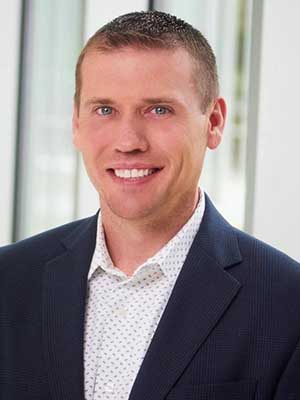Niner Finances: Charting students’ financial success

Often, students leave high school unprepared to navigate the ins and outs of planning their financial futures. UNC Charlotte’s response is Niner Finances, a campus department committed to providing 49ers with programming, resources, education and guidance toward establishing and maintaining their financial success.
“When it comes to financial planning, the best time to save for the future is yesterday, and the second-best time is today,” said Brad Yeckley, director of Niner Finances. His goal is to help students make better financial decisions. As April is National Financial Literacy Month, it’s a perfect time to spread the message.
 “It’s not about the money you make, it’s about the money you manage,” said Yeckley, who was named the 2021 Financial Educator of the Year by The Institute for Financial Literacy. “The reason many adults fail financially is their inability to give up what they want in the now. Making decisions in the moment, based upon emotion or desire, can be disastrous.”
“It’s not about the money you make, it’s about the money you manage,” said Yeckley, who was named the 2021 Financial Educator of the Year by The Institute for Financial Literacy. “The reason many adults fail financially is their inability to give up what they want in the now. Making decisions in the moment, based upon emotion or desire, can be disastrous.”
Niner Finances is in its second academic year of operation. Yeckley joined the University in March 2020 from Penn State University, where he completed a bachelor’s degree in human development, an MBA in corporate finance and a Ph.D. in workforce education. He was charged with establishing Charlotte’s financial literacy program. Vice Chancellor of Student Affairs Kevin Bailey, who arrived at Charlotte in 2017, recognized the imperative of financial literacy for college students. Nationally, research showed that most undergraduates started college with little exposure to financial well-being either from families or high school.
Building Charlotte’s program during COVID was challenging, but Yeckley relied upon lessons learned at Penn State University. He developed 30 seminar topics and recruited and trained student peer ambassadors to deliver group presentations and provide one-on-one counseling. Custom presentations also are available.
For the 2021-22 academic year, Niner Finances delivered 103 presentations and conducted 228 individual coaching appointments, reaching 5,113 students. The office continues to build partnerships throughout campus with student affairs-affiliated organizations and academic colleges to extend its reach.
“We started our first academic year as a program with one staff member but finished as a department with two full-time staff, seven peer ambassadors and funding for a graduate assistant,” noted Yeckley.
For fall 2022, Niner Finances added additional student peer ambassadors, and through group presentations and individual coaching, the department reached more than 4,000 students.
“We’re still a work in progress, but we’re experiencing exponential growth,” Yeckley stated.
Dimensions of financial literacy
Niner Finances focuses on programming related to five major areas of personal finance based upon national benchmarks: earning, spending, saving/investing, borrowing and protection. A sixth one, the psychology of money and decision making, is an area of specialization for Yeckley.
Today’s undergraduates are savvier than in the past, and while information is readily available via the internet, students are overwhelmed by what they discover about personal finance and realize they need guidance. Yeckley is fond of saying, “They are choking on information but starved for wisdom.”
Jonathan Smith, a sophomore computer science major, learned about Niner Finances through an introductory course on becoming a computer professional, which led him to attend individual coaching.
“I thought it would be cool to have some free financial advice as I start to become more financially independent,” Smith said. “I didn’t have a really good understanding of investing or even how to get started, but through Niner Finances I was able to learn what all of the different acronyms and terms mean, and I deepened my knowledge on those topics that were briefly touched on at my high school. I feel I have learned a lot, and I am better informed than when I first stepped into their office.”
Teaching financial literacy is a continuum
Smith’s limited exposure to personal finance via high school is typical. Yeckley’s philosophy for teaching financial literacy is using an adult learning model: instruction that is just in time, relevant and conducted consistently over time.
“Financial literacy among higher education institutions often is a single course, resulting in students making a lot of mistakes financially after graduation,” said Yeckley. A member of the North Carolina Council for Economic Education, he is among the financial professionals who advocated change. High school freshmen in North Carolina, starting with fall 2022, will be required to complete a curriculum in personal finance and economics prior to graduation. Yeckley is working with colleagues across the UNC System to align the high school curriculum with college programming.
“North Carolina’s students will benefit greatly as they transition from high school to college,” said Yeckley.
A peer approach
Ronni Lilly is a peer ambassador with Niner Finances. A junior majoring in business analytics and marketing analytics, Lilly works with students individually to create personalized learning plans.
“I love seeing students progress through their financial journeys,” said Lilly who has been a peer ambassador for eight months. Prior to working with fellow students, she completed an intensive training program.
“As peer ambassadors, our goal is to educate students on how to build a strong foundation for their financial success,” she explained. “It’s rewarding to see them begin to apply the concepts we teach.”
Lilly said most students are seeking assistance with budgeting, building long-term savings and how to make low-risk investments. In addition to developing curated financial literacy plans for students, peer ambassadors are accountability partners, ensuring students remain intentional about their financial well-being.
Concerned by debt
The national debate surrounding borrowing money to finance college education is transforming how students view debt.
“We’re seeing more students expressing concerns with debt, and they are exercising more discretion with credit cards than in the past,” Yeckley stated. “They tend to ask more questions and are borrowing only what they need. However, there is data that highlights under-borrowing, with students working more hours to finance college. This can be to their detriment if it results in diminishing their academic success. There is one school of thought that student loans are ‘evil’ and should be avoided, but we talk about how student loans are a beneficial financial tool if used correctly.”
The path to financial success
Budgeting is the place every student should begin their financial journey. Making smart decisions contributes to financial success.
“I ask students if they have a savings account. If they say yes, then I ask how much money is in it. Often, they respond with ‘nothing, because they’ve spent it,’” said Yeckley. “Actually, they really don’t have a savings account. You must be able to reserve money over time to develop the behavior of saving. Once mastered, you are in a better position to manage credit.”
Should all members of Niner Nation visit the offices of Niner Finances?
“I can always find something that a student doesn’t know to open their eyes. We get tremendous feedback on the value of our presentations,” said Yeckley. “If Charlotte students can spend an hour of time learning about financial literacy, even just once a semester, it will set them up for a lifetime of financial success. Isn’t that one of the best returns on investment you’ll ever get?”
Illustration by Kyahdric Moses, assistant director of creative services, student affairs marketing.